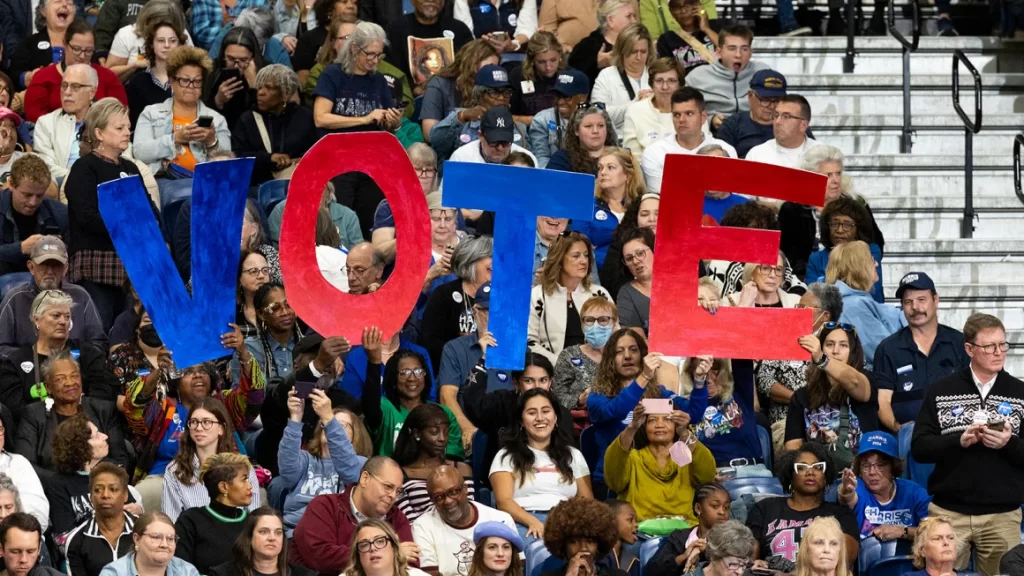Democrats Eye House Gains with Robust Fundraising Efforts
3 min read
Huge fundraising powers Democrats’ hopes to flip the House

Huge fundraising powers Democrats’ hopes to flip the House
In the lead-up to the 2022 midterms, Rep. Cindy Axne of Iowa, the last Democrat representing the state, urgently sought additional funds from party leadership to secure her seat. Unfortunately, the much-needed cash didn’t arrive, and Axne lost her Des Moines district by approximately 2,000 votes—one of nearly two dozen close contests that contributed to the Democrats losing their House majority that year.
Fast forward to the present, and the financial landscape for Democrats has dramatically shifted. They are now targeting not one, but two Republican-leaning seats in Iowa. A significant part of this fundraising surge can be attributed to Vice President Kamala Harris, who raised an astonishing $1 billion in just three months. This influx of cash is empowering down-ballot Democrats and raising alarms among Republican leaders. With Democrats now better funded, they are actively contesting seats in traditionally red areas, such as Iowa and Wisconsin, that have been slipping away from them in recent years.
Democratic gains in the Midwest are particularly noteworthy, as they build upon the already competitive GOP-held districts in New York and California. The influx of summer fundraising has expanded the battleground, with Democratic leaders eager to exploit every potential avenue to reclaim control. This newfound financial muscle is forcing Republicans into a defensive posture, limiting their ability to contest seats they once considered secure in areas like southwestern Connecticut and parts of Nevada.
Christina Bohannan, a Democrat running in a neighboring Iowa district, reflects the newfound optimism. Bohannan has shattered fundraising records in her rematch against GOP Rep. Mariannette Miller-Meeks, outraising her opponent and significantly outspending her. As the campaign enters its final stretch, Democrats plan to further amplify their spending.
Republicans are acutely aware of the threat; House Speaker Mike Johnson and other top GOP figures are scheduled to visit the district to rally support. “People are just fired up,” Bohannan noted. “We had a great message in 2022 but didn’t have the resources to spread it effectively.”
However, the path to flipping the House is not solely dependent on fundraising. While Democrats need to gain only four seats to regain control, voter concerns surrounding issues like the economy and immigration still favor the GOP. Additionally, former President Donald Trump’s continued appeal among Hispanic and working-class voters poses a challenge for Democrats aiming to flip seats, particularly those in battleground states.
Rep. Elise Stefanik, the House Republican Conference chairwoman, stated, “There is no candidate in modern history who turns out voters more effectively than President Trump.” This sentiment underscores the ongoing impact Trump has on voter mobilization, particularly in Republican strongholds.
As election day approaches, Republicans are feeling the pressure of Democrats’ financial advantage. Out of the 32 most competitive House seats, only two Republicans managed to outraise their Democratic challengers in the latest fundraising quarter. Notably, several Democratic candidates are breaking the $2 million mark in contributions, enabling them to mount formidable campaigns.
For instance, in a hotly contested seat in Virginia, GOP candidate Derrick Anderson raised $1.1 million, but Democrat Eugene Vindman garnered an impressive $6.5 million, allowing him to outspend his opponent significantly. Similar patterns are emerging in races across the country, prompting Republicans to respond with last-minute fundraising appeals.
The sheer scale of Democratic fundraising has alarmed GOP leaders. In Nebraska, Rep. Don Bacon warned of a “tsunami” of Democratic spending in his district, largely driven by Harris’s efforts. Meanwhile, GOP incumbents are finding themselves increasingly outmatched in the fundraising arena, raising concerns about their viability in tight races.
Despite the challenges, Republicans are hopeful about retaining seats in heavily Hispanic districts where they believe Trump’s appeal will bolster their chances. However, Democratic leaders like Rep. Henry Cuellar emphasize the importance of not taking Hispanic voters for granted, particularly as border issues become a focal point in the upcoming elections.
As both parties prepare for a fiercely contested battle, it remains clear that financial resources will play a crucial role in determining control of the House. Whichever party prevails is likely to face a tightly divided chamber, setting the stage for continued political tensions in the coming years.